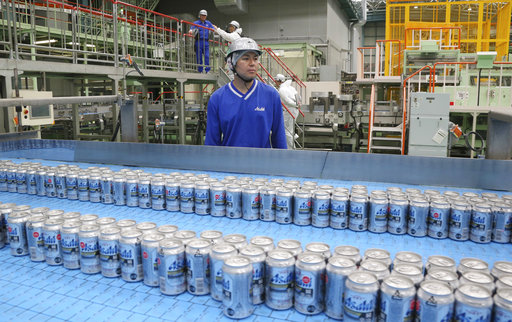Tons of jars are loaded with lager, topped and washed, wrapped into six-packs, and boxed at confounding rates—1,500 a moment, to be correct—on murmuring transport lines that zip and twist in a sprawling processing plant close Tokyo.
The machines do all the truly difficult work at this plant keep running by Asahi Breweries, Japan’s best brewer. The human employment is to ensure the machines take every necessary step right, and to keep an eye on the quality the sensors are checking.
Shinichi Uno, a director at the plant Said that fundamentally, nothing turns out badly. The lines are up and running 96 percent. Despite the fact that machines make things, individuals administer the machines.
The level headed discussion over machines grabbing employments from individuals is quieted in Japan, where birth rates have been sinking for a considerable length of time, raising apprehensions of a work deficiency. It is elusive a culture that commends robots increasingly, apparent in the prominence of partner robots for shoppers, sold by the web organization SoftBank and Toyota Motor Corp, among others.
Japan, which fashioned a major push toward apply autonomy beginning in the 1990s, drives the world in robots per 10,000 specialists in the car area—1,562, contrasted and 1,091 in the U.S. what’s more, 1,133 in Germany, as indicated by a White House report submitted to Congress a year ago. Japan was likewise ahead in parts outside vehicles at 219 robots for every 10,000 specialists, contrasted and 76 for the U.S. also, 147 for Germany.
One factor in Japan’s diverse interpretation of robotization is the “lifetime work” framework. Real Japanese organizations by and large hold laborers, regardless of the possibility that their capacities wind up plainly obsolete, and retrain them for different assignments, said Koichi Iwamoto, a senior individual at the Research Institute of Economy, Trade and Industry.
That framework is beginning to shred as Japan globalizes, however it’s still to a great extent being used, Iwamoto said.
In spite of the fact that information from the Organization for Economic Cooperation and Development indicate digitalization lessens interest for mid-level routine assignments, for example, running mechanical production systems—while boosting interest for low-and high-gifted occupations, that pattern has been less articulated in Japan than in the U.S.
The OECD information, which examined shifts from 2002 to 2014, demonstrated business patterns remained practically unaltered for Japan.

That implies organizations in Japan weren’t turning as forcefully as those in the U.S. to robots to supplant people. Administrative laborers, for example, were keeping their occupations, despite the fact that their employments should be possible better, in principle, by PCs.
That sort of imperviousness to embracing advanced innovation for administrations additionally is reflected in how Japanese society has so far selected to keep taxis as opposed to moving to online ride hailing and carry administrations.
In any case, computerization has advanced in Japan to the degree the country has now entered what Iwamoto called an “intelligent stage,” in which “human harmony with machines” is being sought after, he said.
Iwa also reported that a few errands might be better performed by individuals as all things are considered.
Kiyoshi Sakai, who has worked at Asahi for a long time, reviews how, before, can tops must be put into machines by hand, a dreary undertaking that was hard on the body, as well as the brain.
Thus he is appreciative for computerization’s assistance. Machines at the plant have turned out to be more than 50 percent littler throughout the years. They are quicker and more exact than three decades prior.
Gone are the days things used to turn out badly constantly and human mediation was expected to get machines running appropriately once more. Each 10 to 15 minutes, individuals used to need to go keep an eye on the items; there were no sensors in those days.
Glitches are so few nowadays there is scarcely any motivation to work up a sweat, he included with a grin.
In the same way as other specialists in Japan, Sakai doesn’t appear to be stressed over his employment vanishing. As the requirement for plant laborers nose-jumped with the progress of mechanization, he was elevated to the general issues area, a typical managerial division at Japanese organizations.
Sakai, who drinks lager consistently said that he recall the work being so difficult. Being that as it may, when he recollect, and it was tied in with conveying awesome brew to everybody, it makes him so glad.
He further added he have no second thoughts. This is a steady occupation for him.

Nicholas is a dedicated and experienced author of this tech blog. He wants to be helpful and offer great content to his readers, but he also needs to make sure that the site is profitable so it can continue running. If you have any questions or concerns about our work please don’t hesitate to contact us!













